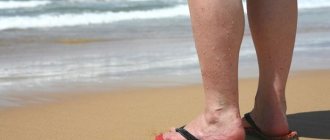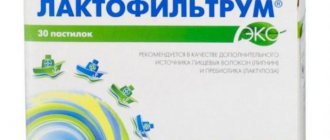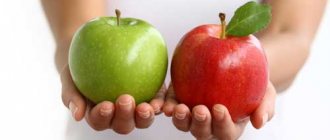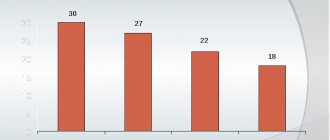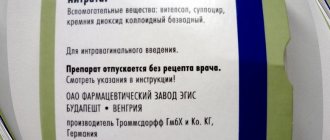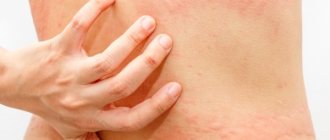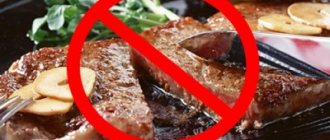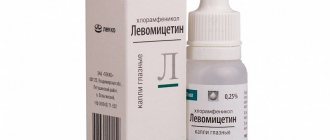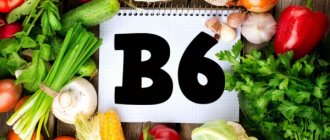What should be meant by the term “thick blood”? This is a high concentration of formed elements (red blood cells, leukocytes, platelets), combined with excess sugar, cholesterol, and lipids.
All this together provokes an increase in the activity of cell membranes, which is why the same red blood cells and platelets literally “stick together,” thereby forming blood clots. And the main reason for too “thick blood” is unhealthy food in the diet.
What products help thin the blood in the human body and prevent the formation of blood clots? Using information from official medical sources, we have compiled a list of 24 most suitable foods for this purpose, and also formulated general nutritional rules. At the end of the article we will talk about foods that, on the contrary, thicken the blood.
Blood thinners - list
Today, doctors have many different blood thinners to choose from. They will use the most appropriate drug depending on the person's condition and will consider:
- patient's family and medical history
- risk factors for blood clots
- thrombus location
- is this the first blood clot
- severity of vessel blockage
There are two categories of blood thinners: antiplatelet agents and anticoagulants.
Antiplatelet drugs, or antiplatelet agents
A person may receive injectable, intravenous, or oral antiplatelet drugs. Antiplatelet drugs that people take by mouth include:
- aspirin
- clopidogrel (Plavix)
- ticagrelor (Brilinta)
- prasugrel (Effient)
- pentoxifylline (Trental)
- cilostazol (Pletal)
- dipyridamole (Persantine)
Injectable or intravenous antiplatelet drugs include:
- tirofiban (Aggrastat)
- eptifibatide (Integrilin)
Anticoagulants
In some situations, doctors prescribe anticoagulants. There are three classes of anticoagulants:
- heparin and low molecular weight heparin
- vitamin K antagonists such as warfarin
- direct oral anticoagulants
Blood clotting is a complex process that depends on many factors. Warfarin prevents the formation of vitamin K clotting factor. Direct oral anticoagulants inhibit other factors, such as an enzyme called thrombin, both in the blood and in existing clots. Heparins also inactivate thrombin, which helps with thrombosis and prevents the formation of new ones.
6-9: Berries
Many berries contain essential amino acids and ascorbic acid, which helps the body get rid of excess cholesterol and lipids (that is, stimulates their breakdown by the liver).
The most useful in this regard are cranberries, black currants (red and white have a fairly high content of tannins, which increase blood viscosity), and viburnum.
Kalina
Viburnum contains a whole range of resin-like essential oils (about 2% of the total weight of the berry), which have a positive effect not only on the cardiovascular system, but also on the immune system.
But it is worth considering that their content decreases sharply when the berries are dried, so they should be eaten fresh.
Cranberry
This berry contains the highest amount of B vitamins among all others.
It also contains rare vitamins such as K1, PP - they help normalize the functioning of the endocrine system. But it is hormones that regulate the processes of lipid breakdown and the absorption of carbohydrates and proteins.
This is why eating cranberries reduces blood viscosity.
Black currant
Currants are good for the blood because they contain no less vitamin C than lemons. Moreover, this is relevant not only for berries, but also for the leaves of the bush (that is, you can prepare a decoction). To provide your body with a sufficient daily intake of ascorbic acid, it is enough to eat only 20–30 berries daily.
They also contain sulfur, silver, copper and even lead - these elements well regulate metabolic processes in muscle tissue, thereby helping to strengthen the heart muscle and improve the tone of blood vessels (which also consist of elastic muscle tissue).
Mulberry
The most useful for reducing blood viscosity is black mulberry - it contains phytoncides and essential oils .
Also, its inclusion in the diet will help get rid of chronic diseases of the gastrointestinal tract and prevent the development of constipation.
See also:
- 10 more berries that help thin your blood
Side effects
People who take blood thinners are at increased risk of bleeding. In case of injury, bleeding may not stop for a long time. Sometimes bleeding may require medical attention. The most common side effects of antiplatelet drugs include:
- nose bleed
- blood in urine
- hemorrhage or bleeding
- bleeding in the stomach
- labored breathing
- low platelet count in the blood
- aspirin-induced asthma
- nasal polyp
Warfarin can also cause bleeding. Some people may experience severe bleeding. Other side effects of warfarin include:
- nausea
- vomiting
- abdominal pain
- bloating
- flatulence
- change in sense of taste
If a person begins to bleed, the doctor will stop the drug and the patient will be given plasma or prothrombin complex concentrate intravenously. Direct oral anticoagulants are associated with lower rates of bleeding, including life-threatening brain hemorrhages. If a person experiences severe bleeding or hemorrhage, the doctor will stop the drug and the person will be given protamine sulfate, which inactivates heparin. Other side effects that may occur while using heparin:
- low platelet count in the blood
- osteoporosis
- bone fractures
- low levels of aldosterone, a hormone that regulates salt and water levels in the body
- allergic manifestations
What should you avoid?
But it’s not enough to just include food in your diet that will help thin your blood. You should also refuse (or rather, minimize their consumption) from those foods that contribute to blood thickening. These include:
- Almost all dairy products. Milk contains casein, which is a special carbohydrate that breaks down into derivative elements only under the action of certain groups of enzymes. Simply put, these are complex carbohydrates, which take many times longer to digest than fructose and other simple sugars. This is why dairy products thicken the blood.
- Alcoholic drinks. All of them contain ethyl alcohol, which is perceived by the body as poison. Its breakdown, neutralization and removal from the body is accompanied by the use of a huge volume of liquid (and this is why a person feels very thirsty after drinking alcohol). At the same time, alcohol increases blood viscosity exponentially. This is true even for small amounts of weak alcohol. At the same time, you should definitely avoid vodka and beer, which tend to thicken the blood. Use cognac with caution. But red wine has a special effect on the blood, which you can read about in a separate article.
- Animal fats. Pork, beef, sausage products - all contain animal fats that break down into lipid compounds. When there is an excess of them in the body, they are not absorbed, but are deposited in the subcutaneous tissue, as well as in the blood vessels themselves. You shouldn’t completely exclude animal fats from your diet, but it should still be based on grains, vegetables and fruits.
- Potato. In principle, absolutely all products that contain a large amount of starch (for example, rice) can be written here. It is transformed into carbohydrates in the body, which contributes to a sharp increase in sugar levels in the blood plasma and its thickening.
- Bananas. Although they are fruits, they contain a large amount of carbohydrates. If you do eat them, then no more than 2 medium-sized fruits per day (and even less for children).
Antiplatelet drugs
Substances that interact with aspirin or antiplatelet drugs:
- potassium-sparing diuretics
- nonsteroidal anti-inflammatory drugs (NSAIDs), including ibuprofen (Advil)
- steroid drugs
- alcohol
In addition to interacting with other blood thinners, Plavix and Effient may interact with opioids. Plavix also interacts with omeprazole (Prilosec), which reduces stomach acid.
A physician should closely monitor a patient who is taking blood thinners.
Risk factors leading to increased blood viscosity
Many medications cause the blood to become thick and begin to flow more slowly through the vessels. The more sugar a person consumes, the higher the risk of blood clots, as this negatively affects blood viscosity. Other risk factors include hereditary diseases of the hematopoietic system, pathologies of the liver and pancreas.
The thicker the blood, the worse a person feels. He gets tired faster, suffers from daytime sleepiness, and at the same time his memory and attention deteriorate. If you notice similar symptoms, you should not postpone your visit to the doctor. Otherwise, you can wait for the development of such serious health problems as: heart attack, stroke, pulmonary embolism, hypertensive crisis, etc.
Warfarin
Doctors prescribing warfarin should warn people about drug and food interactions with this anticoagulant. Substances that interact with Warfarin:
- antibiotics
- antifungal drugs
- plant and herbal products
- other anticoagulants and antiplatelet drugs
- foods containing vitamin K
It is necessary to have regular blood tests while taking warfarin. Doctors recommend that people taking warfarin pay attention to the vitamin K content of the foods they eat. People taking warfarin should not avoid vitamin K completely, but they should limit their intake.
13-24: Other products
Doctors also recommend that your diet be sure to include nuts, fatty fish, honey, flaxseed oil, dried fruits - all this helps to reduce viscosity and increase the alkaline balance of the blood (this also reduces the likelihood of blood clots and removes some manifestations of existing thrombosis).
Nuts and seeds
Almost all of them contain vegetable and essential oils, resins, which are biologically active additives. They help digest proteins, carbohydrates, and fat cell derivatives.
The healthiest nuts are pistachios and walnuts (but peanuts are “harmful” - they contain a very large amount of complex proteins and fats). Seeds include poppy, dill, sunflower, and many varieties of pepper (in the form of peas).
Dried fruits
Dried fruits improve blood composition because they contain easily digestible fructose and fiber. Dried berries are considered more beneficial for the cardiovascular system, in particular: cranberries, blueberries, blackberries, hawthorn.
But you shouldn’t overuse them – you can end up with excess vitamin C and blood sugar.
Porridge
All cereal porridges are important for the blood because they contain fiber. This includes oatmeal, buckwheat, and rolled oats. But rice, on the contrary, should be discarded, since it contains a large amount of starch (which is a tannin).
An excellent combination is porridge with dried fruits. Fiber will help the gastrointestinal tract more actively receive nutritional components from food, as well as normalize the water-salt balance of the blood plasma.
Omega-3 fatty acids
The highest content of such acids is found in fatty fish and flaxseed oil. These components are most needed by the brain, as they stimulate metabolic functions between cell membranes. And at the same time, they reduce the likelihood of “adhesion” of red blood cells and platelets .
The easiest option to increase the concentration of omega-3 fatty acids in the body is to consume fish oil (costs mere pennies, sold at any pharmacy).
Linseed oil
As mentioned above, it contains omega-3 fatty acids. In principle, this oil is considered one of the most useful among vegetable oils.
The only caveat is that it should not be used for frying (as this releases many harmful carcinogens).
Honey and propolis
Bee products are also important for blood. They are a source of minerals, metals and salts. At the same time, almost 30% of honey consists of ordinary water, there is no fat at all.
And carbohydrates are presented in the form of easily digestible fructose, which has minimal effect on blood sugar levels.
Propolis also contains phytoncides and essential oils - these elements will help strengthen the immune system and remove accumulated toxins from the blood.
Turmeric and other spices
The main element of turmeric is curcumin, which is an antioxidant. It also stimulates oxygen saturation in the blood and prevents a decrease in the tone of the heart muscle.
Many spices also contain rare antioxidants, which have a complex positive effect on the functioning of the cardiovascular and endocrine systems.
The most useful spices are:
- basil (fresh and dried);
- thyme;
- white pepper;
- saffron.
Apple vinegar
Apple cider vinegar is a mixture of a whole range of organic acids that normalize the balance of intestinal microflora and also break down lipid compounds.
Grape vinegar acts in a similar way, but it has a higher alkali content, which can negatively affect diseases of the gastrointestinal tract.
Soda
The main beneficial property of soda is that it increases the alkalinity of blood plasma. And the higher the pH level, the better, since in this case the risk of adhesion of formed elements is reduced exponentially, and at the same time the likelihood of micro-scratches on the inner walls of blood vessels is reduced.
But you should not abuse soda, since it is based on sodium, and its excess in the body has a toxic effect on the neural system.
Ginkgo biloba
It is a universal stimulant of the cardiovascular system. Not only improves blood composition, but also stabilizes blood pressure. You should not overuse ginkgo biloba, as this can cause energy deficiency.
The recommended daily intake is only 15 grams (and children under 14 years of age are generally recommended to exclude it from the diet).
Artichokes
They normalize the water-salt balance and provide the body with a huge portion of vitamins K and B-group .
The content of vitamins and their concentration are preserved during heat treatment of artichokes or during their preservation.
Kalanchoe
This also includes aloe and a whole range of medicinal plants, which contain viscous and sticky juice - this is facilitated by resinous essential oils.
The use of decoctions and folk recipes based on them will help strengthen the heart muscle, remove most of the toxins from the blood, and normalize the tone of blood vessels (this will prevent the thinning of their walls).
It is necessary to take into account that both Kalanchoe and aloe are powerful allergens. Accordingly, if you are going to use them, you should first conduct a test on the body’s reaction to make sure there is no hypersensitivity.
Also check out the table:
What not to eat
So, we found out what you can eat if you have a blood clot in your leg. What ingredients should not be used when preparing daily meals for a patient with thrombosis?
- Fatty meats, poultry, smoked meats, spicy meat delicacies.
- Starchy foods: potatoes, bananas, especially sweet varieties.
- Walnuts, coriander.
- Strong teas, coffee, sweet drinks, especially with gas.
- Marinades, pickles, all canned foods.
- Jellied on strong meat broth.
- Alcohol and all drinks based on it. It not only thickens the blood, but also causes spasms of the vessels, provoking their deformation. Isn't it a disastrous combination for thrombophlebitis of the legs?
Literature
- Dobrovolskaya MA, McNeil SE (May 2015). “Safe anticoagulation when the heart and lungs are” on vacation. Annals of Translational Medicine 3 (Supplement 1): S11. Doi: 10.3978/j.issn.2305-5839.2015.02.03 PMC 4437941. PMID 26046056.
- Blood-thinning foods, drinks, and supplements. Medically reviewed by Stacy Sampson, DO — Written by Jayne Leonard on January 15, 2021.
- Chua, Y. T., Ang, X. L., Zhong, X. M., & Khoo, K. S. (2015, January). Interaction between warfarin and Chinese herbal medicines. Singapore Medical Journal, 56(1), 11–18.
- Marx, W., McKavanagh, D., McCarthy, A. L., Bird, R., Ried, K., Chan, A., … Isenring, L. (2015, October 21). The effect of ginger (Zingiber officinale) on platelet aggregation: A systematic literature review. PloS One, 10(10), e0141119.
- Ivanova, O. Horned root // Gardener: magazine. - No. 11. - 2006.
Features of use for various diseases
Based on blood thinning products, many drug regimens for the treatment of various diseases are created.
For hypertension
High blood pressure, for example, is well controlled by ginger, which is able to “clean” blood vessels, normalizing lipid metabolism and preventing the deposition of atherosclerotic plaques, lysing harmful low-density cholesterol, thinning thick blood, and relieving vascular spasm.
Most often, ginger is used in the early stages of treating hypertension or for preventive purposes. Starting from the second stage, pharmacological agents are required for treatment. In this case, ginger can provoke a sharp drop in blood pressure when combined with antihypertensive therapy, especially if there is a large gap between the systolic and diastolic readings.
For hypotension
There is a version that peony is used for low blood pressure, since the plant has general tonic properties and improves microcirculation of the heart muscle. The dosage and duration of taking the drug should be determined by a doctor so that the blood pressure balance is stable and long-lasting, and a sharp drop in blood pressure is excluded.
For atherosclerosis
For atherosclerosis, the combination of clover and ginger is optimal, since the Omega 3 and 6 acids they contain clean blood vessels from plaque, minimize the level of LDL in favor of HDL, while simultaneously thinning the blood.
For varicose veins
For varicose veins and thrombophlebitis, a decoction of white willow bark is recommended, since the plant is able to strengthen the vascular wall, relieve inflammation, and due to salicin, it reduces the risk of blood clots better than aspirin, leaving the gastric mucosa intact.
If you are prone to heart disease
In this case, ginger is also indicated, since the product contains a large amount of substances that normalize the functioning of the heart, prevent complications, including myocardial infarction, and balance the functioning of the coagulation system, the formation of blood clots, and vascular tone.
Reviews
Irina, 25 years old
When carrying my second child, the blood tests were not the best. The doctor prescribed Vessel do ef. He recommended eating more berry-fruit smoothies and kefir. After a month's course, laboratory test results returned to normal. I did not observe any adverse reactions when taking the medication; the composition was well tolerated.
Valentina Ilyinichna, 52 years old
I went to the clinic with pain in my legs. It turned out that blood viscosity exceeds standard values. For liquefaction, it was suggested to take Clopigrant. For 4 weeks I took the drug according to the regimen in the instructions. From the second week I felt relief, the pain disappeared, and even at the end of the working day I did not feel heavy. For prevention purposes, the doctor advised taking the medicine with a break of 3-4 months.
Advantages and disadvantages
| pros | Minuses |
|
|
Garlic
Garlic
Garlic has natural antibacterial and antimicrobial properties, as well as anticoagulant activity and reduces the formation of blood clots. The best way to reap the benefits of garlic is to crush the cloves with the flat of a knife to “release” the beneficial compounds, then eat the cloves raw or quickly roast them in the oven.
A pineapple
Pineapple baked with pepper, recipe here
The tropical fruit contains a special protein-breaking enzyme, bromelain, which is considered an effective remedy for cardiovascular diseases and high blood pressure. Research shows that bromelain can thin the blood, break up blood clots, and reduce their formation—include pineapple in your diet if you want to prevent thickening of your hair. Bromelain also has anti-inflammatory properties.
The main thing is the drinking regime
In order to thin the blood, it is better to start with a drinking regime: without clean water, a healthy diet is pointless. The recommended amount of water is 1.5-2 liters per day, but there are general norms for liquids in general: for 1 kg of weight - 45 ml per day, i.e., a woman weighing 60 kg needs about 2.7 liters. This includes juices and compotes, teas, juicy fruits and vegetables, liquid broths and soups. You should not replace healthy liquids with coffee and sweet soda.
Experts have different opinions about drinking water after meals and even during meals. You shouldn’t wash down your food with mugs of water, but a few sips during or immediately after won’t hurt, but dry food might.
You really shouldn’t drink tea and coffee after meals - digestion will worsen and more toxins will enter the bloodstream, but homemade kvass or apple cider, on the contrary, will perfectly “accelerate” the blood.
Fruits, vegetables and berries, seafood and some seasonings help thin the blood.
Hirudotherapy
This is a medical procedure using leeches. They stick to human skin to absorb blood. The benefit of the session is to improve blood circulation, enhance venous outflow of blood from tissues and organs. Course therapy improves blood pressure, blood viscosity decreases, headaches and discomfort in the heart disappear.
When a leech bites, it releases enzymes that have a number of valuable properties:
- thin the blood, block the production of thrombin (hirudin);
- resolve scars (hyaluronidase);
- form new capillaries (organase);
- relieve inflammation (eglins, bradykinins);
- lower the level of total cholesterol (apyrase);
- suppress plasmin, thrombin (bedelins).
The complex of enzymes provides a therapeutic effect in combination with antiseptic, bactericidal, antiviral effects.
Before using hirudotherapy, you must be tested for hemoglobin and red blood cells. If the indicators are reduced, the procedure is contraindicated.
Olive oil
Olive oil
Consuming olive oil at least once a week reduces platelet activity, thanks to the antioxidants contained in the oil. The study found that people who consumed extra virgin olive oil, which is high in phenolics, had lower levels of blood clot-promoting substances. Just don’t heat-treat olive oil, as it loses its beneficial properties. Add it to salads, sauces, dip bread in it.
